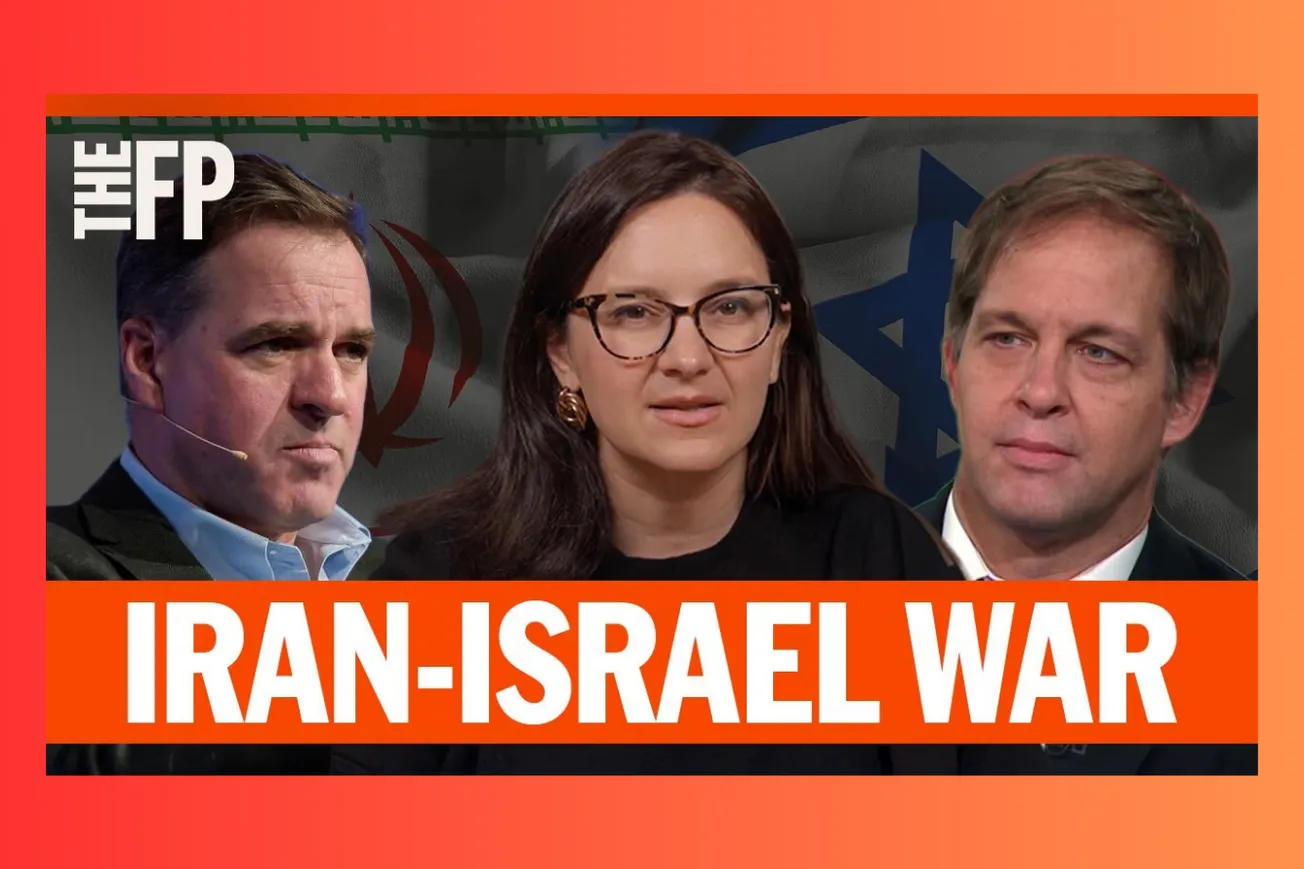Table of Contents
We're witnessing something that could reshape the entire Middle East. Four days into what many are calling the Israel-Iran war, the situation on the ground looks dramatically different from what anyone predicted just a week ago.
Key Takeaways
- Israel has achieved complete air dominance over Iran, something Vladimir Putin failed to accomplish in Ukraine despite years of trying
- The Iranian Revolutionary Guard Corps leadership has been systematically decimated, with military commanders killed in their beds by precision airstrikes
- Iran's nuclear facilities at Natanz and Isfahan have been damaged, but the heavily fortified Fordow site remains intact and operational
- Mossad intelligence operations inside Iran appear unprecedented in scope, suggesting extensive human networks within the regime
- Trump's administration is torn between restrainers who want to avoid another Middle East war and hawks pushing for decisive action
- The conflict could trigger a broader nuclear proliferation crisis if Iran successfully develops weapons capability
Israel's Stunning Air Campaign Shows Military Superiority
What's happening in the skies over Iran right now represents one of the most effective air campaigns in modern military history. Israeli pilots are flying missions deep into Iranian territory with apparent impunity, something that seemed impossible just days ago.
The scope of Israel's achievements in less than a week is staggering. They've managed to take out almost the entire leadership level of the Islamic Revolutionary Guard Corps - the real power behind Iran's theocratic facade. More than a dozen nuclear scientists are dead. Top Houthi commanders in Yemen, Iran's proxy force, have been eliminated. The damage to Iran's primary uranium enrichment facility at Natanz and the uranium conversion site at Isfahan sends a clear message about Israeli capabilities.
"This is what Vladimir Putin would have loved to achieve over Ukraine and failed to achieve," notes historian Niall Ferguson, highlighting just how remarkable Israel's air dominance really is. The combination of air superiority and systematic decapitation of enemy leadership represents textbook military strategy executed with precision.
What makes this even more impressive is the intelligence component. As veteran war correspondent Dexter Filkins reveals, Israeli military officials told him they tracked Hassan Nasrallah, the now-dead Hezbollah leader, every single day for nearly 20 years since 2006. "There wasn't a single day when we didn't know where he was," a senior Israeli official explained. That level of intelligence penetration extends throughout the region - they're killing Iranian military leaders "in their beds from the air."
The Iranian miscalculations here are almost breathtaking in their scope. They apparently believed they could rely on deterrence and bluffing rather than actually strengthening their air defenses. The longer time that passed after Israel's previous strikes on Iranian air defenses last year, the more concerned observers became that Iran would repair and upgrade their systems. They completely failed to do that.
Inside Iran's Crumbling Regime Structure
Here's what most people don't understand about Iran: the mullahs you see giving speeches aren't really running the country. The Islamic Revolutionary Guard Corps is the steel frame holding everything together, and Israel is systematically dismantling it piece by piece.
The regime's vulnerability runs deeper than most realize. During a reporting trip to Iran in 2020, Filkins witnessed something extraordinary that reveals the regime's fundamental weakness. At a party in North Tehran, where senior Republican Guard officials live, he found an entirely parallel society operating in secret.
"They had pulled down, closed the curtains, taped up the windows, closed everything, sealed it up, bribed the guards at the end of the street," he recalls. "Women came in miniskirts, there was moonshine, music playing really loudly. The mullahs couldn't have been a million miles away. It was like an entire parallel society had grown up right next to the Iranian regime."
But here's the crucial part - on his way home at midnight, Filkins encountered roadblocks set up by the Basij militia, Iran's domestic enforcement arm. They were pulling people out of cars, checking IDs, creating an atmosphere of terror. The question now becomes: what happens when that threat of force disappears?
The Supreme Leader Ali Khamenei is 86 years old and has no clear succession plan. This isn't unique - none of the authoritarian regimes in what Ferguson calls the "Axis of authoritarians" have proper succession planning. Putin doesn't, Xi Jinping doesn't, and Iran definitely doesn't after Khamenei's designated successor died in a mysterious helicopter crash.
Without the Revolutionary Guard's military structure and with an aging leader who could die at any moment, the regime sits on incredibly shaky foundations. The parallel society Filkins witnessed suggests the Iranian people have already mentally moved beyond the current system - they're just waiting for the right moment.
The Fordow Facility: Iran's Nuclear Trump Card
All roads in this conflict lead to one place: the Fordow uranium enrichment facility buried 300 feet under concrete in the Iranian desert. This facility represents Iran's path to nuclear weapons capability, and it's proving to be the most challenging target for Israeli forces.
According to Filkins' conversations with former White House officials, Israel simply cannot destroy Fordow from the air using conventional methods. "The United States can do that with B-2s and B-2 bombers and 30,000 pound bunker buster bombs," he explains, "but the Israelis might be able to do it if they're willing to put people on the ground."
The revelation that Israel has been practicing ground operations to assault Fordow adds an entirely new dimension to this conflict. We're potentially looking at a special forces operation that would have no historical parallel - Israeli commandos infiltrating deep into Iran to personally disable the country's nuclear program.
Netanyahu framed this in the starkest possible terms during a recent interview, calling it "an existential war meant to prevent a second nuclear holocaust." When you're talking about preventing a nuclear holocaust, how many lives are you willing to sacrifice? That calculation appears to be driving Israeli strategic thinking.
The site is so heavily fortified that any ground assault would require killing everyone inside and physically disabling the equipment. It sounds like something out of a movie, but former officials suggest it's exactly what Israel is preparing for. As one White House source told Filkins, "It's a free shot" - meaning Iran's air defenses are so degraded that Israel could potentially pull off such an operation.
Trump's Middle East Dilemma: Restrainers vs. Hawks
The internal battle within the Trump administration over Iran policy reveals fascinating tensions about America's role in the world. On one side, you have what Ferguson calls the "restrainers" - figures like Bridge Colby and others influenced by JD Vance's "why are we bothering with these dark places" philosophy.
On the other side, hawks within the State Department under Marco Rubio, including figures like Michael Anton, argue that Iran was approaching nuclear breakout and action was necessary. The International Atomic Energy Agency's May 31st report stating that Iran wasn't complying with non-proliferation obligations gave Netanyahu the opening he needed.
What's particularly interesting is how different Trump 2.0 appears from Trump 1.0 on Middle East issues. The first Trump administration was symbolically supportive of Israel - moving the embassy, orchestrating the Abraham Accords. But this version seems much more focused on "real estate politique" rather than geopolitical strategy, prioritizing business deals with Gulf states over traditional alliance relationships.
The Israelis apparently didn't expect Trump's readiness to revive negotiations with Iran or see Steve Witkoff playing the role of Middle East negotiator. As Ferguson notes, "Every administration is much more than just a court around a president," and the different factions are pulling policy in different directions.
The Camp David meeting that Axios reported on appears to have been decisive. The decision was apparently made to give Israel a green light while maintaining plausible deniability. Notice how Marco Rubio used the word "unilaterally" when describing Israeli actions, even though the U.S. clearly knew this was happening.
The Mossad's Unprecedented Intelligence Network
The intelligence component of this operation deserves special attention because it's revealing capabilities that seem almost superhuman. We're talking about an intelligence network that has penetrated Iran so thoroughly that they're killing military leaders in their beds and tracking every movement of terrorist leaders for decades.
The key insight here is that most of these operatives probably aren't Israelis at all. Given the widespread animosity toward the regime inside Iran, Mossad has apparently recruited extensively from within. "Whenever an Iranian leader sits down in a meeting, he has to wonder who's working for the other side," Filkins observes. That level of paranoia fundamentally complicates decision-making at the highest levels.
What's particularly remarkable is how they're doing this despite extreme security measures. Filkins recalls meeting Hezbollah operatives in Lebanon who weren't carrying cell phones or any electronic devices - yet Israel still managed to eliminate them. The pager explosions in Lebanon demonstrated technological capabilities that seemed straight out of science fiction.
The human intelligence component appears to be massive. You need people on the ground to set up drone facilities, provide real-time targeting information, and coordinate complex operations across multiple countries. The grainy videos coming out of Iran showing these operations suggest an intelligence penetration that's unprecedented in scope.
There's also a temporal element that's crucial. Israeli officials told Filkins they were confident they would know if Iran began weaponizing nuclear material - meaning they have someone on the inside of the nuclear program itself. The timing of these strikes, coming exactly 61 days after Trump said he'd give negotiations 60 days, suggests they received that tip-off.
Economic and Strategic Calculations
One of the most surprising aspects of this conflict has been the relatively muted economic response. Oil prices haven't spiked the way many predicted, partly because neither side wants to disrupt oil flows through the Strait of Hormuz - yet.
Both Israel and Iran have incentives to avoid hitting oil infrastructure. For Iran, anything that sends oil prices soaring increases the likelihood of direct U.S. intervention. For Israel, it increases the chance that Trump gets impatient with their operations. But if Iran gets desperate, all bets are off.
"What happens if the Iranian regime gets desperate?" Filkins asks. "They have indicated many times very clearly they would attack the Saudi oil fields. They would sink tankers in the Straits of Hormuz." These aren't idle threats - they're contingency plans that could make this war "really, really big."
The Chinese factor adds another layer of complexity. China relies heavily on Iranian oil and has been playing fast and loose with sanctions to acquire it. Admiral Samuel Paparro recently told the Senate that China has begun rehearsing for an invasion of Taiwan - these are no longer drills, they're practicing for the real thing.
The timing couldn't be worse from a strategic perspective. War games at the Center for Strategic and International Studies show horrific outcomes for any Taiwan scenario, with Chinese forces sinking three American aircraft carriers and destroying a quarter of the U.S. Air Force. The danger period is right now, before America can close capability gaps by 2030.
What Comes After This Regime?
The question of what follows the current Iranian regime if it collapses reveals some uncomfortable truths about regime change in the Middle East. The people Filkins partied with in North Tehran - educated, westernized Iranians who want freedom - probably represent the least likely group to emerge victorious from chaos.
"When you destroy the state, democracy just doesn't bubble up naturally," Filkins observes. "What bubbles up naturally is anarchy." Iran is a sophisticated, middle-class society, but decades of repression have driven most potential democratic leaders out of the country or underground.
Ferguson adds another troubling dimension, referencing his wife Ayaan Hirsi Ali's prediction that the Arab Spring would produce an "Islamist winter." The most extreme elements in the Muslim world actually benefit from the collapse of authoritarian regimes because they can operate more effectively in chaos.
As Ferguson notes, citing a nearly 20-year-old Salafist text called "The Management of Savagery": "What we most want is for all the authoritarian regimes in the great crescent to fail because then we can create the caliphate, then we can create the Islamic State."
The lowest probability scenario might be the liberal, democratic Iran that many people hope for. The highest probability scenarios involve either continued authoritarian rule under different management or dangerous chaos that extremist groups could exploit.
This conflict is ultimately about much more than Iran's nuclear program or even Middle East dynamics. It's a test case for the entire international order that's emerged since World War II. The non-proliferation regime that's kept nuclear weapons limited to a small number of countries for over 50 years might be breaking down completely.
If Iran survives this with its nuclear program intact and manages to break out to weapons capability, the conclusion that countries around the world will draw is simple: if you have nuclear weapons you're safe, if you don't you're not. That's a recipe for rapid proliferation globally, not just in the Middle East.
As Ferguson puts it, "We're seeing a new kind of cold war in which there is no effective regime of non-proliferation, and that's a dangerous world." The stakes here extend far beyond the current fighting - they're about whether the international system that's maintained relative peace for decades can survive the challenges of the 21st century.





![This New Bitget Platform Changes the Game [Literally Gold]](/content/images/size/w1304/format/webp/2026/02/bitget-launches-universal-exchange-gold-usdt.jpg)